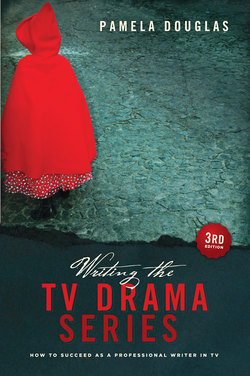Читать книгу Writing the TV Drama Series 3rd edition - Pamela Douglas - Страница 8
На сайте Литреса книга снята с продажи.
ОглавлениеINTRODUCTION
More than a thousand students have come through my classes in the two decades I’ve taught at the USC School of Cinematic Arts. At the same time, my professional career was growing to include story editor and producer credits on television dramas, the Humanitas Prize, and awards and nominations including Emmys, Writers Guild, and American Women in Radio and Television, and a position on the Board of Directors of the Writers Guild. Always, my screenwriting and teaching have complemented each other.
I bring my working life into the classroom: What is it like to be actively breaking stories, writing, rewriting, giving and getting notes, seeing how your scripts translate to screen? I clearly recall freelancing television episodes, but I also know how the other side of the desk reacts to pitches, because I’ve been in both chairs. I’ve written for both broadcast and cable, and for virtually every dramatic genre. In my class, students learn from someone who has been there.
Imagine you’ve stopped by a typical episodic drama class in the middle of a term. Ten students sit at a table, scripts and DVDs from our in-class library — House, The Good Wife, Mad Men, Breaking Bad, Dexter, The Wire — among others in the middle. The class has not begun, but people are returning scripts and discs, reaching for one they want next.
At the beginning of a term I used to ask if any students didn’t have a television so I could pair them with someone who did. But when I asked in 2009, the whole class raised their hands. I started getting on their cases: How can you speculate episodes for shows you’ve never seen? Was it laziness? Arrogance? No!, they responded. They were watching — just not on a television set. Everyone was viewing on a computer, or even a cell phone. They knew even more shows than in previous years; they were ready.
In class, we operate like the writing staff of a TV series in which writers suggest improvements on each other’s work, while I function as “show-runner,” or final authority on revisions. The standard is professional quality, and our models are the most brilliant, incisive, daring scripts on networks or cable. Since I hold the bar so high, no one brings in trivial subjects. Because television drama frequently reflects complex and wrenching problems in contemporary society — such as racism, sexism, violence, spirituality, and sexual identity — the writers must confront these issues with honesty at the same time as they learn their craft.
On other occasions, I come to class in the midst of my writing, full of some creative problem, and let the class in on my process. Or I might screen a clip and deconstruct its elements and how it fits within the total structure of a show. All this leads to finished scripts that aim to be competitive with the best drama written for screen.
That’s my goal for you too as you work with this book. My students are sophisticated, smart, dedicated, and some are wonderfully talented. Still, I was initially surprised at what they didn’t know. When I add my summer seminars, which are open to the public, I discovered strange misconceptions about television, the art and craft of TV drama, and the life of a working writer. That’s one of my reasons for creating this book, since I’m uniquely aware of what beginning writers want and need to learn.
My approach is practical: The better you write, the more work you’ll get. Give ’em better than they deserve because you deserve the best, even if your first assignment is on something you leave off your resume years later.
As you go through this book, imagine that you’re in my classroom. I’ll be talking to you, even asking you questions. Though I can’t hear your answers, I suggest you treat the chapters interactively anyway so that you’ll be applying the principles.
Throughout, you’ll find useful tools, a complete map of the TV series terrain, and lessons from those who have traveled it before. But, ultimately, the way to write better is to be true to what’s real in your stories and to write more. You’re not alone — I’ll show you how.
